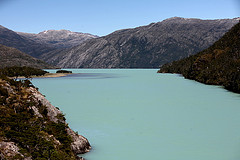Peak Water

Photo credit: Flickr user Untouched Waters. Patagonia's Pascua River, which will be dammed unless immediate action is taken.
“Peak Water”: A panel with Wendy Pabich, Founder, Water Futures; Jonathan Leidich, President and CEO, Patagonia Adventure Expeditions; Tamin Pechet, CEO, Banyan Water LLC; and Rafael Simon, Venture Partner, VantagePoint Venture Partners; hosted by Russ Daggatt, Board Member, American Rivers
1 in 5 people lack access to drinking water today. 40% of the world’s population lacks access to sanitation. 70% of water use is devoted to agriculture.
We’re draining aquifers, polluting freshwater sources and are not testing or monitoring for pollutants.
Why is water so important? Ecosystems
Patagonia is our 3rd largest fresh water system in the world.
Chile’s Baker and Pascua Rivers are facing potential damming.
Officials want to clear cut the rainforest, dam the river in two places and use it for hydro power, when there is plentiful solar power available just up the river. Doing so would break the world’s perfect hydrological cycle. It would destroy 80 % of the regional biodiversity and stop the flux of inorganic nutrients from the icecap to the ocean, which sustains the region’s marine food chain. The proposed project would also displace hundreds of local Gaucho families.
The project would destroy and industrialize the world’s classroom on water and promote unsustainable energy practices.
Visit the Circle of Blue website to learn more about the issue.
Go to www.nrdc.org to find out how to help stop the damming of the Baker and Pascua Rivers.
Patagonia Rising is a documentary detailing the struggle to avoid damming the rivers.
How can we change the way we think about water?
We must look at fresh water as more than just a source of energy, and consider solar as a viable energy source to be considered before hydro electric.
Water issues are not fully utilizing technology. Technology is not currently used for water conservation. As it stands, agriculture receives water almost for free. Therefore, there is no incentive to conserve.
Small, simple changes can alleviate many of the issues with water.
1/2 of the water users in the San Joaquin Valley do not have water meters. Furthermore, there is a strong movement against the installation of further water meters. Mandatory water meter installation would severely cut agricultural water use.
We must internalize the externalities of water over-consumption and pollution, not ship it off to other regulatory sections.
We must reuse our water. Israel reuses 70% of their water. The U.S. reuses 3%. This must change and is beginning to.
There is an enormous amount of imbedded energy in our water transportation, purification, etc. 80% of Hailey, ID’s energy bill goes to the waste water plant.
The Promise of Desalination
90% of San Diego’s water comes from an aqueduct of the Colorado River.
They would hugely benefit from desalination, — cheaper than shipping from N. CA, but they decided not to reuse their water, because it is too pure (pure H2o) and it attacks the pipes, draws iron out of pipe.
Where is water technology going?
Getting cheaper and cheaper. It might cost 4X more per average more than regularly treated water.
Over-watering reduces efficiency of farming; smart water systems not only regulate water use, they improve the agricultural outputs.